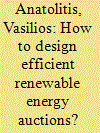|
|
|
Sort Order |
|
|
|
Items / Page
|
|
|
|
|
|
|
| Srl | Item |
| 1 |
ID:
191212


|
|
|
|
|
| Summary/Abstract |
Decarbonizing Europe by 2050 requires significant capital investments in renewable energy (RE). The weighted average costs of capital (WACC) greatly impact RE production costs and influence the government support payments needed for the financial viability of RE projects. Reducing the risks for RE investors can decrease WACC and ensure that the EU meets its climate targets at the least cost. We investigate the potential for lowering support payments to RE projects by de-risking financing conditions through measures including revenue stabilization and low-risk auction designs for solar PV and onshore wind across 21 countries in Europe. We find that de-risking debt is almost twice as effective as de-risking equity. On average, support payments can be reduced by 3.3 EUR/MWh and 1.9 EUR/MWh, respectively, and in some cases, fall to zero. The effects differ across countries, higher-risk countries like Greece would experience more significant benefits from de-risking than lower-risk countries like Denmark and Germany, where support costs depend more on investment variables such as capacity factors. Overall, we show that WACC depends largely on country risk. Nonetheless, de-risking policies like revenue stabilization can improve the investment climate for RE, reduce the need for government support, and contribute to achieving decarbonization targets.
|
|
|
|
|
|
|
|
|
|
|
|
|
|
|
|
| 2 |
ID:
192709


|
|
|
|
|
| Summary/Abstract |
Auctions are a widely used policy instrument to support the deployment of renewable energies (RE). Yet, their complex design raises concerns about explicitly or implicitly discriminatory effects against particular technologies. Such discriminatory effects would distort fair competition, reduce economic efficiency, and potentially violate European Union law.
Several studies analysed discriminatory auction design from a theoretical and simulation perspective but actual empirical evidence is limited. Here, we demonstrate the existence of technology discrimination in European RE auctions empirically. We apply a fractional logit model to empirically measure the impact of various auction design elements on the success of two technologies, solar PV and onshore wind, based on 57 European multi-technology RE auctions from 2011–2021.
Our results confirm the existence of discriminatory effects of several auction design elements in RE auctions, such as installation size restriction, support duration, realisation period, ceiling price, and financial prequalification. The results are stable against various robustness checks such as varying the countries included, the time frame, and the composition of the regions controlled for.
Our findings advance the understanding of explicitly and implicitly discriminatory effects against particular technologies in multi-technology auctions and we propose steps to reduce technology discrimination in future multi-technology RE auctions.
|
|
|
|
|
|
|
|
|
|
|
|
|
|
|
|
| 3 |
ID:
186414


|
|
|
|
|
| Summary/Abstract |
An increasing number of countries use auctions to allocate support for renewable energies. One major objective of policymakers when designing auctions is support cost efficiency, i.e., achieving low awarded prices. Based on a holistic database with auction outcomes from Europe covering the years 2012–2020, we conduct a fixed effects panel data regression to assess the effects of several auction design elements on the awarded prices. According to our results, policymakers aiming for low prices in renewable energy auctions should avoid restricting auctions to small-scale projects, implement ceiling prices, and ensure high levels of competition. Multi-technology auctions can also lead to higher efficiency, while quotas should be avoided. While PV tends to achieve lower prices in auctions restricted to small-scale projects, onshore wind performs better in auctions open to large-scale projects. Feed-in premia, multi-criteria auctions and allowing bidders to deviate from their awarded project capacity show no significant impact. The introduction of financial prequalification requirements and the length of the realisation period should be chosen carefully, as their effects are interrelated. While our results for individual design elements are largely in line with existing literature, we are able to produce new insights on the interdependencies between various auction design elements.
|
|
|
|
|
|
|
|
|
|
|
|
|
|
|
|
| 4 |
ID:
180847


|
|
|
|
|
| Summary/Abstract |
The recent rise of auctions to allocate support payments for renewable energy projects creates new uncertainties during project development and causes a decrease in support levels. We investigate the effects of the shift to auctioning on costs of capital (CoC) and financing conditions through semi-structured and focus group interviews with 40 experts in onshore and offshore wind project development and financing in Europe. We find that auctions create a competitive environment that pressures the industry into accepting higher risks and lower returns. Banks have reduced debt margins, while large investors decreased hurdle rates and equity returns, despite additional risks from auctions, such as uncertainty about future award prices, allocation and qualification risks. The risk of being awarded support and incurring sunk costs makes smaller bidders averse to participating in auctions. Competitive bidding may also decrease secured revenues and increase offtaker risks, especially when combined with sliding premiums. Despite increased price risk, the competitive pressure driven by project sponsors, seems to lower financing costs and hurdle rates, thus decreasing CoC for offshore projects. To reduce negative impacts on CoC and financing, policymakers can minimise additional risks, by adopting remuneration schemes that stabilise revenues, and supporting smaller actors through removing participation hurdles.
|
|
|
|
|
|
|
|
|
|
|
|
|
|
|
|
|
|
|
|
|